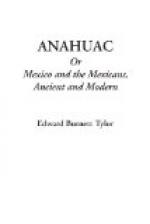All this time the United States are steadily advancing; and the destiny of the country is gradually accomplishing itself. That its total absorption must come, sooner or later, we can hardly doubt. The chief difficulty seems to be that the American constitution will not exactly suit the case. The Republic laid down the right of each citizen to his share in the government of the country as a universal law, founded on indefeasible lights of humanity, fundamental laws of nature, and what not, making, it is true, some slight exceptions with regard to red and black men. The Mexicans, or at least the white and half-caste Mexicans, will be a difficulty. Their claims to citizenship are unquestionable, if Mexico were made a State of the Union; and, as everybody knows, they are totally incapable of governing themselves, which they must be left to do under the constitutional system of the United States; moreover, it is certain that American citizens would never allow even the whitest of the Mexicans to be placed on a footing of equality with themselves. Supposing these difficulties got over by a Protectorate, an armed occupation, or some similar contrivance, Mexico will undergo a great change. There will be roads and even rail-roads, some security for life and property, liberty of opinion, a nourishing commerce, a rapidly increasing population, and a variety of good things. Every intelligent Mexican must wish for an event so greatly to the advantage of his country and of the world in general.
Some of our good friends in Mexico have bought land on the American frontier by the hundred square leagues, and can point out patches upon the map of the world as large as Scotland or Ireland—as their private property. What their gains will be when enterprising western men begin to bring the country under cultivation, it is not an easy matter to realize.
As for ourselves individually, we may be excused for cherishing a lurking kindness for the quaint, picturesque manners and customs of Mexico, as yet un-Americanized; and for rejoicing that it was our fortune to travel there before the coming change, when its most curious peculiarities and its very language must yield before foreign influences.
[Illustration: THE REBOZO AND THE SERAPE.]
APPENDIX.
* * * * *
I. THE MANUFACTURE OF OBSIDIAN KNIVES, ETC. (Note to p. 97.)
Some of the old Spanish writers on Mexico give a tolerably full account of the manner in which the obsidian knives, &c., were made by the Aztecs. It will be seen that it only modifies in one particular the theory we had formed by mere inspection as to the way in which these objects were made, which is given at p.97; that is, they were cracked off by pressure, and not, as we conjectured, by a blow of some hard substance.




